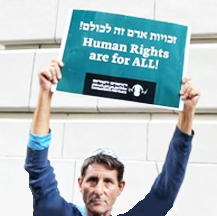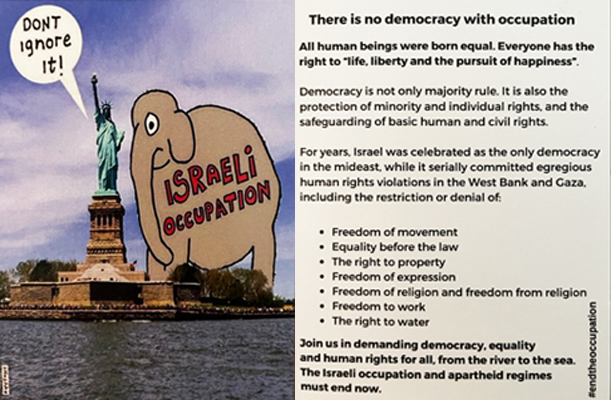On the Ground: Protesting the Israeli Occupation and Bibi
New York — It hasn’t been a good week for Bibi Netanyahu, even if he finally got his sit-down with President Biden. Rallies against him in all forms and iterations were popping up throughout Manhattan. The city was already a madhouse from the overlap of the United Nations General Assembly and Climate Week conferences. From Times Square to the front of the United Nations and Park Avenue across from the Loews Regency Hotel, Israeli and American Jews came out to express their displeasure with Bibi, the Prime Minister indicted for fraud, bribery, and breach of trust.
Tuesday, September 19, was a bright, sunny day in Manhattan—perfect weather for a demonstration. I attended one organized by the anti-Occupation Bloc, known in Hebrew as Hagush Neged Hakibush. I arrived early, which allowed me to scope out the east corner of 61st Street, where a phalanx of security people had set up shop. Aside from the local police, men sat at tables, snacking or looking at their phones. The canine unit was represented. I asked one closest to me who they were. He informed me they were a combination of Homeland Security, Secret Service agents, and regular cops.
On the Park Avenue pavement, a few people remained from the previous session of the ongoing anti-Bibi vigil. I spoke with a few, wondering if they were also early for the 5 p.m. event. It turned out that they would be traveling up to the Metropolitan Museum of Art, where Biden was hosting world leaders, and reports suggested he had included Netanyahu.
My question, “Are you here for the anti-Occupation rally?” was not well received.
I learned from a couple that they were from Tel Aviv. The man said, “It’s about democracy,” before he walked away. When I tried to continue the conversation, he tsked me dismissively.
I had a hearty exchange with a 40-year-old Israeli man who lived in Chicago. He doubted he would return to Israel other than to visit. Initially from Jerusalem, he offered that his grandparents came from North Africa. He said that he still saw two separate states as the best option and posited that the fundamental problem stemmed from religious enmity between Jews and Arabs. He suggested human rights abuses were “a byproduct of the Occupation.” He explained that he didn’t feel like he really had a place on the “Israeli map.” He also voiced his dislike of Haredi Jews. “I was brought up as an Israeli,” he said. “An atheist Israeli.” Then he asked me, “Why do you care so much about Israel? All the concerned [American] Jews. It kind of bothers me.” Before I could ask a follow-up question, he stated, “You have to be there. The solution is a liberal dictatorship.” I wasn’t sure if he was kidding, but the dialogue had clearly run its course.
The sidewalk began filling up with individuals carrying signs in Hebrew, English, and Arabic. “Democracy and Occupation cannot coexist; No Democracy with Jewish Supremacy. Israelis against Netanyahu’s Apartheid laws.” Printed material and stickers showed an enormous elephant with the words “Israeli Occupation” across its body.
The first person I interviewed was Tamara, who was born in New York and grew up in Jerusalem and Tel Aviv. Now based in Brooklyn, she said, “I’m here because it’s an opportunity for a sea change in Israel. The Occupation is killing us. What American Jews don’t get is that it’s [about] the Jewish people, not the Jewish religion. For me, it’s not about religion.” She suggested a concept I have heard previously: “American activists bring their [national] history with them” to the table. Tamara wants Progressive American Jews to lobby their elected officials to take away the ongoing United States funding to Israel and start speaking about the issues more. “It’s complicated,” she said. “It’s not black and white. We have to stop doing the horrible stuff we’re doing. It has to stop.”
Mindy, an American Jew standing behind me, was wearing a button, “AntiZionism≠AntiSemitism. “I grew up Orthodox,” she said. “The whole nine yards. Bibi should not be feted.” She emphasized, “Democracy and Occupation cannot coexist.”
While we were talking, a tall man hurried through the crowd, engaging in a verbal interaction. The exchange was in Hebrew, but the vibe was palpable. I asked for a translation. “You’re okay with that?” he had asked everyone, referencing the Palestinian flag held by an attendee. The consensus was uniformly affirmative.
It was time for speakers. First up was Rabbi Amichai Lau Lavie, the co-founder of Lab/Shul. “I’m glad to see so many of us here today,” he began on a high note. Then, the tone shifted. “I’m really angry. I’d rather not be here in front of the Regency.” He spoke about teshuvah, tefilah, and tzedakah (repentance, prayer, and good deeds). His words were greeted by drumming and shouts of Bushah, which in Hebrew means an extreme form of shame. Lau Lavie broke down the steps for action. “Democracy for everyone! We feel shame for the Occupation. We have to start looking in the mirror. How can we ask for forgiveness for not doing more?” He moved to “Responsibility. To fight for all.” Then came “Tikkun. What am I going to do for change? We have to look truth in the eye. Take this anger and change it into Tikkun. It’s on us! Wake up, American Jews!”
Drumming, whistleblowing, and chants erupted:
“From the river to the sea,
We demand democracy.
Everybody must be free,
Freedom and equality.”
Gili Getz, photojournalist, actor, and activist, jumped out of his role as a visual documenter of the event to speak. “People who occupy other people will never be free,” he said. He pointed to “armed and violent settlers” who act with impunity and the “system of supremacy” at play. “Palestinians are being killed in numbers we haven’t seen in a decade.” Getz noted, “Yesterday, the Prime Minister met with one of the leading spreaders of antisemitism.”
The drumming and vocalizing began anew:
“Don’t forget, Don’t Ignore,
Occupation’s at the core!”
Rabbi Jill Jacobs of T’ruah gave the final speech. An article in Haaretz recently profiled her as one of the new female leaders challenging the entrenched structure of the male Jewish legacy organizations. She told the demonstrators, “It’s important for me to be here. We’re dealing with a settler government. Occupation is destroying Judaism.” She referenced the Biblical metaphor: “A calf doesn’t have to be golden. It can be a state.”
Jacobs spoke about hope and the time between Rosh Hashana and Yom Kippur. “The sins of the past don’t have to determine the future.” She stressed moving forward with something new instead of going back to old paradigms. She emphasized how the current crisis has “opened an opportunity.” Jacobs didn’t shy away from calling out “willful ignorance” and those American Jews funding right-wing advocates in Israel. For Jacobs, the bottom line was fighting for the civil rights of Israelis and Palestinians.
A statement from Libby Lenkinski, Vice President for Public Engagement at the New Israel Fund, was read into the record, and more percussion accompanied the calls for justice:
“No to the government of fascism and Kahanists!”
I connected with Matan Arad-Neeman from the If Not Now movement as signs were taken down and the gathering was ending. His Israeli parents had initially relocated to Seattle for an employment opportunity and ended up staying. “It’s moving to have Israelis and American Jews come out together and speak against Occupation and apartheid.”
Ben Weinberg, one of the organizers, shared the objective of the Occupation Bloc. “Our goal is to fight to end Occupation. We’ve been too fixed on a solution, which ends up not being productive. We have to focus on the bad stuff.”
Walking to Third Avenue, I processed the continuum of opinions and voices I had heard in a matter of hours. My blood was still rushing from the intensity of the experience.
The most resounding voices in my head were the shouts and the rallying call:
“Don’t forget, don’t ignore,
Occupation’s at the core!
We’re the generation,
That ends the Occupation.
Democracy for All?
Yes!”

Photo: Marcia G. Yerman






